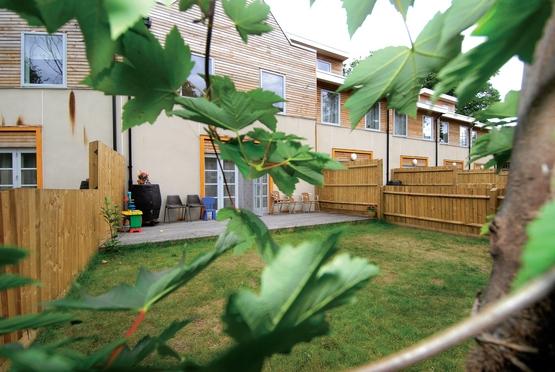Leading man
How will the green deal work in practice? Nick Duxbury talks to Michael O’Doherty, the man trailblazing the UK’s first ever pilot scheme, to find out
Michael O’Doherty is the north west’s very own green puppeteer. As the head of climate change at Manchester Council and Greater Manchester housing retrofit programme lead he is single-handedly co-ordinating the sustainability strategies of 10 local authorities in the Greater Manchester area, plus a further 25 local housing associations through the Association of Greater Manchester Authorities. By controlling the city-wide strategy - the ‘low carbon economic area for the built environment’ (see box overleaf: The Greater Manchester retrofit challenge) - the 42-year-old is effectively laying the foundations for £8.3 billion of retrofit investment in Greater Manchester.
Of course Mr O’Doherty has counterparts who are pulling the strings of city-wide sustainability in the likes of Birmingham, London and Bristol - and he is competing with them to claim Manchester’s share of the economic opportunities to emerge from the green deal. This is the government’s flagship retrofit scheme through which households receive energy efficiency works without upfront costs and repay the money to private sector providers through savings on their energy bills. Indeed, the former head of housing at Manchester Council sits alongside many of his peers on the Department of Energy and Climate Change’s local authority advisory board, working to ensure their respective cities get maximum economic benefit from the £7 billion a year private sector market the green deal is expected to create. But right now Manchester is leading the show.
Mr O’Doherty has just found himself overseeing the first ever road test of the green deal ahead of its launch in October 2012. All eyes are now focused on Manchester as it hosts what the government has called its green deal ‘trailblazer’. Given the sector’s concerns about how the scheme will work and the growing pressure on the government to ensure it is a success, the honour of hosting this trial could be something of a poisoned chalice for Mr O’Doherty. He was approached by Communities and Local Government department back in January, following a meeting a year earlier in which he had flagged up the potential role of social landlords in the green deal. The next month housing minister Grant Shapps raced up to Salford to promise the trailblazer would save up to £500 a year on tenants’ energy bills as well as creating more than 1,800 jobs and give a £100 million boost to local businesses.
If Mr O’Doherty is intimidated by the prospect of successfully delivering all this, he hides it well. ‘I think it was on the back of the level of collaboration we have across a large number of housing providers,’ he says in a casual explanation as to why Manchester was picked by the CLG for the trial. ‘We have 260,000 social homes in Greater Manchester, and we have agreement from the [housing association] chief executives that while there is still a developing market, we can share costs, compare different offers and use our combined scale. There are lots of national groups looking at the green deal across the UK, but what no one has done is test its various aspects: financing, engagement, technicalities and procurement,’ he explains.
Two into one
When Sustainable Housing first spoke to Mr O’Doherty a month ago he was expecting to work on two green deal pilots: CLG’s ‘trailblazer’ for social homes in Manchester, and, separately, British Gas’ £30 million ‘go-early’ pilot in private homes around the city. The former was about getting the infrastructure in place to support a retrofit market and trialling funding models; the latter was about scrutinising the pay-as-you-save system and testing the ‘golden rule’ - whereby savings on fuel bills must exceed the costs of the works over time.
However, it has since turned out that the ‘go early’ model did not fit so well with AGMA’s vision of how the green deal should be piloted in Greater Manchester. So, three weeks later, the British Gas scheme has tacked on to the trailblazer to form a hybrid. An early name being considered for this is the ‘green deal go-early trailblazer’.
While this might not be overly catchy, it does make sense to have just one government-backed green deal trial with a private sector partner that includes both private and social tenures. In this first phase, AGMA is bringing 9,000 of the 25,000 hard-to-treat social homes in Greater Manchester from 10 housing providers. Alongside this the British Gas ‘go-early’ influence will bring in an additional 3,000 private customers - mostly from right to buy residents on the same estates as the social tenants. The trial is intended to demonstrate PAYS and the golden rule working on a large scale. Therefore, the total 12,000 homes will be split into separate projects to test the PAYS mechanism in different scenarios - but what these scenarios will be is still subject to discussion.
‘For me, the trailblazer is about creating supply chains and a track record,’ explains Mr O’Doherty, of the project, which is still being developed but should kick-off in earnest in the next two months. ‘To attract private investment, the green deal needs to have created some kind of track record,’ he continues. ‘We need to show that it’s deliverable and scalable. We want to have a bankable proposition we can show investors; and it will allow both us and central government to hit the ground running.’
Mr O’Doherty is clear on what aspects of the green deal he wants the trial to clarify for landlords: the role of social landlords in the green deal, understanding of the mix and feasibility of funding needed, clarity over how energy company obligation funding can support the green deal, how to secure consent for works from tenants and how to make PAYS work. Oh, and he wants a supply chain of local companies to be developed along the way.
Financial backing
While many of the details about how it will do all this are yet to be decided, there is one interesting certainty: the cost of Mr O’Doherty’s green deal, which is not yet calculated but will be ‘tens of millions’, will not be funded as is intended for the real green deal. The government plans for private finance to pay for the upfront costs of the measures and then for residents’ resulting energy savings to repay the investors through a PAYS mechanism over a period of 25 years.
While the trailblazer will adopt a PAYS mechanism, the finance will not come from the private market. In fact, none of the retailers such as B&Q, Tesco and Marks & Spencer that are frequently namechecked as being private sector providers of green deal finance, are included in the pilot.
The British Gas go-early scheme intended to use the energy company’s own equity as well as finance secured with Barclays. This is understood to be at a rate of 6.9 per cent - similar to the levels discussed at our green deal round table. But it is now thought that, although British Gas still intends to apply its Barclays-financed scheme elsewhere, it will not be using private finance for the Manchester project. Instead, it is working with AGMA to use as much community energy saving programme and carbon emissions reduction target money as possible - both of which are pooled from energy bills - and then looking at plugging the gap at a lower cost of capital through the council.
Mr O’Doherty has already dedicated many an hour to pulling together other funding sources to act as said plug in the absence of energy company obligation, known as ECO, that will support the green deal for hard-to-treat and fuel-poor homes where the golden rule does not work.
He has obtained £10 million of European regional development cash which is split across five retrofit projects including those run by 10,500-home Salford-based arm’s-length management organisation Salix Homes, which is heading the first 2,500-property stage of the pilot using unspent Decent Homes funding. He has also applied, with British Gas, for some of the government’s £1.4 billion regional growth fund cash, and is looking to bring this together with investment from social landlords, and institutional funding from the Evergreen north west investment fund. And, on top of these sources, through AGMA, he is understood to be in advanced talks with property consultancy Drivers Jonas Deloitte to set up a special purpose vehicle to invest in solar photovoltaic panels and take advantage of the government’s feed-in-tariff - though he declines to comment on this.
‘The funding for this [green deal pilot] is mainly coming from utility companies,’ says Mr O’Doherty. ‘The PAYS element could be from providers themselves. As the pilot develops, we will look to bring in partners [private sector companies]. We are still developing our long-term approach. And that is about making sure that we procure partners in the right way, and understanding the roles of local authorities in strategic partnerships - that’s not clear at all. We are still exploring whether or not we need to go through the Official Journal of the European Union process and procure all our green deal providers.’
So what about the relationship with British Gas? ‘We are not their [Manchester Council’s] preferred green deal partner yet,’ stresses Alan Neild-Crabb, senior head of energy solutions at British Gas Community Energy. ‘But we obviously hope that if we do a good job on this trailblazer pilot then we will be in a strong position to bid for the green deal [proper] ourselves.’
Away from this pilot, it looks as though AGMA and the energy giant are bedding in together on other schemes. The pair have agreed a number of other Greater Manchester-based deals of late: British Gas is the preferred CESP funding partner for the city, and has also just agreed a £30 million CERT deal which will make British Gas the delivery partner on AGMA’s ‘Toasty’ campaign to deliver heavily subsidised loft and wall insulation private sector households. The amount of funding secured, and the scale of the project, means the cost of the measures will drop as low as £50 per home as it tries to hit a target of 100,000 measures in the next 12 months.
Mr O’Doherty is measured on this. ‘The important thing to say is that in all our work with British Gas…,’ he pauses as he chooses his words, ‘…we are keen that this is about developing the whole supply chain in Greater Manchester - not just the British Gas supply chain. It’s about creating opportunities for local people through local installers to try to grow the supply chain ahead of the introduction of the green deal.’
The fact Mr O’Doherty managed to pull some strings to get British Gas to adapt its original go-early plan to fit his social housing-led vision for Greater Manchester’s role in the green deal bodes well for local companies and landlords in Manchester and other cities alike. Handling the government’s expectations of the ‘green deal go-early trailblazer’ may be the true test for the north west’s green puppet master.
The Greater Manchester retrofit challenge
- 2.6 million people living in 1.1 million households
- lAround 9,000 hard-to-treat social homes in Greater Manchester
- Aims to save 6 million tons of carbon dioxide by 2015 and deliver £650 million of economic benefits, supporting 34,800 jobs
- Aims to deliver 75 per cent of basic energy efficiency measures - lofts and cavity wall insulation - by 2013. This equates to 400,000 measures
- Aims to make ‘in-depth behavioural change advice’ available to all households by 2015
- Aims to roll out smart meters in every home








